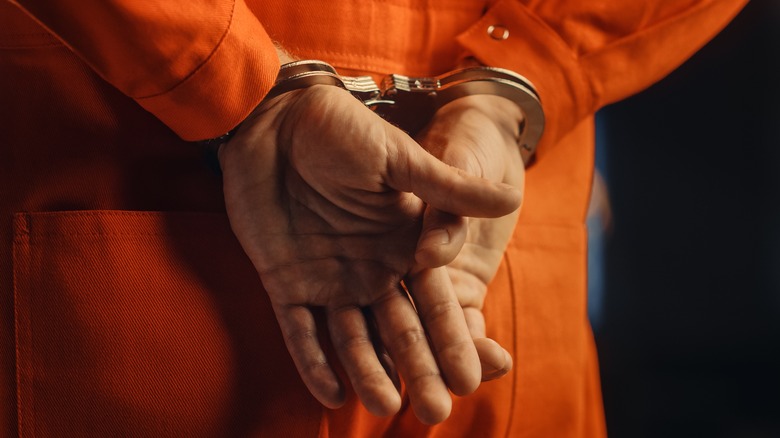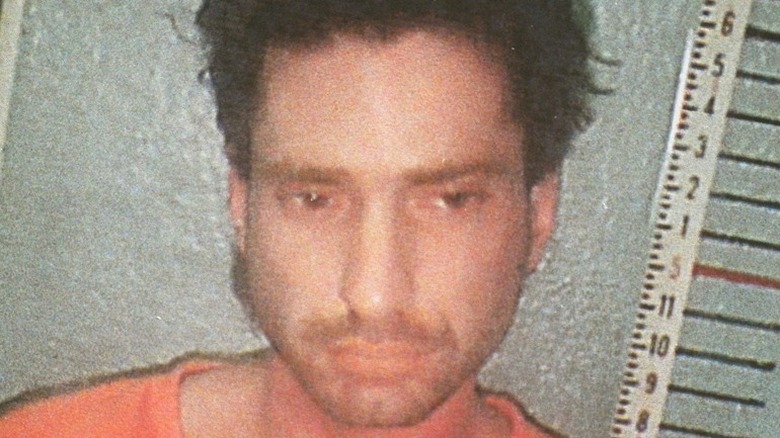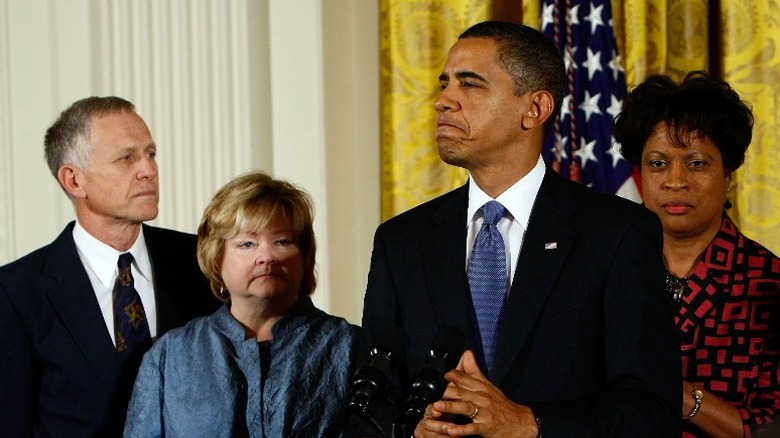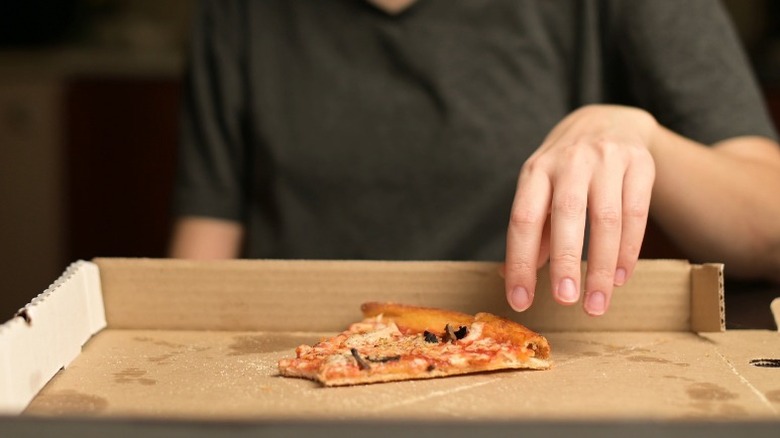The Tragic Murder Of James Byrd Jr Explained
Though full of grand accomplishments, American history has many horrors that have been woven into her fabric. Though far from this nation's only historic fault, racism has been one of the most discussed and one that some will say not enough has been done about. Even as a nation corrects its faults by passing new legislation and establishing systems that combat the hate and ignorance that fuels racism, it still rears its ugly head in the most horrific of forms at times.
A cursory read through a reputable American history book will glance over eras where lynchings against Black Americans seemed to be commonplace. And even though these brutal crimes aren't the norm today, there are more modern examples of this barbaric and lawless practice than you might think. As recently as 2020, the murder of Ahmaud Arbery was deemed a "21st-century lynching" by civil rights leaders, including the Reverend Al Sharpton (via CNN).
The common method of execution during a lynching is hanging, but this form of savage "justice" isn't limited to the use of a rope. A mob-led to killing a person without the benefit of a legal trial is considered a lynching (via Britannica), perhaps giving a new perspective to some who might now think of the illegal act a bit differently. In one of the most terrifying lynchings in recent memory, James Byrd Jr. was beaten and dragged behind the back of a pickup truck until he succumbed to his injuries.
The perpetrators
Although the killers — John King, Lawrence Brewer, and Shawn Berry — were quickly brought to justice, the violent mark this crime left on the town of Jasper, Texas will be there for years to come. The men were not strangers to law enforcement. According to Britannica, each of them had criminal records, leading to King and Brewer becoming acquainted with each other while they were each serving time in prison. Several weeks before they murdered Byrd, King and Brewer became roommates. They had both been affiliated with white supremacy gangs while incarcerated, their bodies adorned with multiple racist tattoos. Guy Gray, the district attorney who prosecuted the murder cases, revealed that King's body was covered in hateful ink, including the words "Aryan Pride," the image of a Black man hanging from a tree, and various Nazi symbols (per CNN).
The three men were out drinking and driving around in Berry's pickup truck on the evening of June 7, 1998, when they spotted Byrd walking on his way home. During his trial, Berry testified that he knew Byrd from around town, but wasn't well acquainted with him. Regardless, the men offered Byrd a ride and the man got into the back of Berry's vehicle. Witnesses would later state that sometime between 2 a.m. and 4 a.m. they saw Berry's truck drive by with three white men in the cab and a man who appeared to be Byrd in the bed (via Britannica). This would be Byrd's worst mistake.
The horrific crime
But instead of driving Byrd home as promised, he was taken to a remote spot off a country road. He was savagely beaten and tortured before he was slowly and painfully murdered by his assailants. NPR tells us that while sipping from the drink he was given, Byrd was struck repeatedly with a baseball bat. While on the ground, his face was spray painted. One of his attackers began to urinate on him.
The killers then secured chains around Byrd's ankles. The chains were hooked to the back of Berry's pickup truck. With King now at the wheel, the trio proceeded to travel down the gravel road that took them to the scene of the attack. CNN reports that during the murder trial, a forensic pathologist testified that Byrd was alive for at least two of the three miles he was dragged. Two miles in, his body struck a culvert and separated his head and right arm from his body. When the truck came to a stop, the killers left Byrd's torso just outside an African American cemetery (per Texas Observer). They went about their day, stopping off at a friend's BBQ party.
The legacy left behind
For their part in Byrd's murder, Brewer and King were sentenced to death. Brewer was executed on September 21, 2011, and showed no remorse for his crimes. On the day before he was executed, he stated in an interview with KHOU 11 News that he had "no regrets," and would "do it all over again" (via Huffpost). After losing appeals, King was put to death on April 24, 2019. The avowed white supremacist had maintained his innocence throughout the trial and conviction but offered no last words from the execution chamber.
On October 27, 2009, President Obama signed a historic piece of legislation into law that was inspired in part by the brutality of the Byrd lynching case. The Matthew Shepard and James Byrd Jr. Hate Crimes Prevention Act was attached as part of that fiscal year's defense bill, allowing for its passage after a decade's worth of stalling (per USA Today). The law took effect in early 2010 and provides funding for state, local, and tribal governments to investigate and prosecute suspected hate crimes. The U.S. Department of Justice states that this law also makes it a federal crime to use any weapon to do bodily harm to anyone based on their actual or perceived race, color, religion, national origin, gender, sexual orientation, gender identity, or disability. The law was named in part after victim Matthew Shepard, who was beaten and murdered in Wyoming in 1998. Shepard was gay, motivating his attack.
One of Byrd's killers managed to inadvertently change an old Texas prison tradition
Oddly enough, one of the condemned killers of Byrd was able to single-handedly change a near-century-old custom in Texas that prison officials allotted for their death row inmates: He is why there are no longer "last meal" requests in the entire state. The New York Times reports that Brewer made an unusually large meal order for his last repast, that included two chicken-fried steaks, a cheese omelet, fried okra, one pound of BBQ meat with half a loaf of white bread, three fajitas, one meat lover's pizza, a pint of ice cream, peanut butter fudge, and three root beers.
When this giant feast was delivered to him as his last meal, Brewer looked at it and said he wasn't hungry. After he didn't eat a bite, the entire meal was discarded. After a request from the Texas State Senate, the Department of Prisons abolished this 87-year-old custom immediately. Those on death row scheduled for execution would thereafter receive a last meal that was the same as what was served to everyone else on the unit.




